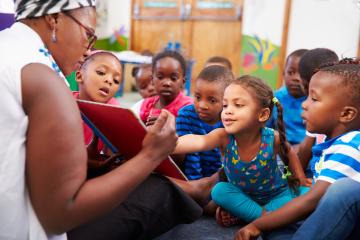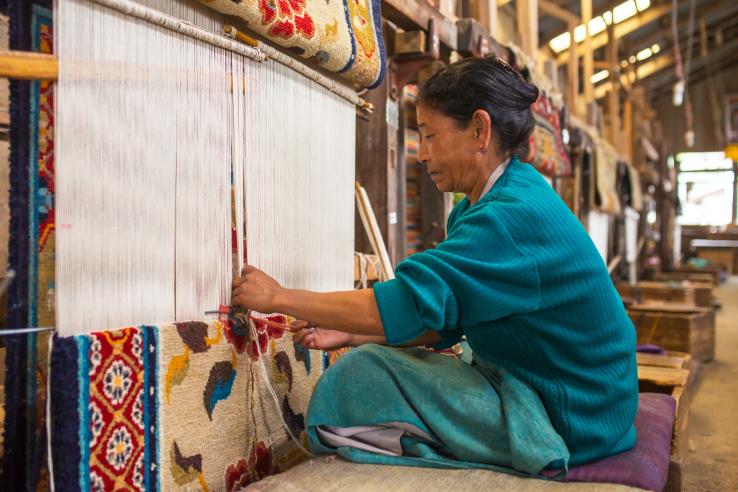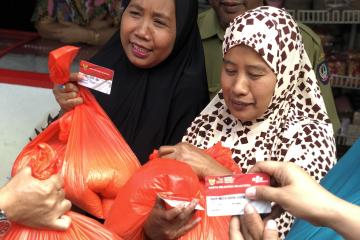
New Displaced Livelihoods Initiative will help advance sustainable livelihoods for displaced and host communities

This piece is also posted on the Innovations for Poverty Action blog.
Today, we announce the launch of the Displaced Livelihoods Initiative (DLI), jointly managed by Innovations for Poverty Action (IPA) and the Abdul Latif Jameel Poverty Action Lab (J-PAL), with generous support from the IKEA Foundation. DLI is the world’s first research fund dedicated to generating rigorous experimental and quasi-experimental evidence to inform policies and programs that can foster sustainable livelihoods for displaced and host communities. In addition, DLI will provide investment in research infrastructure and public goods, including panel datasets, software, and measurement innovations that can contribute to future impact evaluations.
Today, over 100 million people have been forcibly displaced. In other words: more than one percent of the world’s population have fled their homes to escape violence, conflict, or persecution. Projected to continue growing, displacement is also intertwined with broader development challenges such as poverty, food insecurity, and climate change.
The scale and complexity of displacement have pushed the international donor, practitioner, and research communities to seek more cost-effective, durable solutions to displacement. A key feature of this effort focuses on strengthening economic inclusion and self-reliance through livelihoods and other programming that support pathways towards economic inclusion.
There is limited evidence, however, about the impact of such programs on displaced populations and host communities. To meaningfully support displaced people in rebuilding their lives, it is necessary to understand what kinds of interventions can help them access employment, integrate into local labor markets, and become self-reliant—as well as learning how these policies and programs impact host communities.
Contributing to durable solutions with evidence that shapes effective policies and programs
DLI will fund innovative research which can inform the design of policies and programs that empower refugees, internally displaced persons, asylum seekers, and others in refugee-like situations to achieve self-reliance. DLI will support collaborations between researchers and leaders in government, NGOs, and the private sector, with a particular view to the participation of persons with lived experience of displacement.
Livelihoods interventions typically aim to increase food security, income, employment, and asset ownership. DLI seeks to invest in efforts that go even further and address the social and economic ability of an individual, household, or community to meet their needs sustainably, meaning they can cope with and recover from the stress and shocks of changing circumstances. Building on existing evidence and in close consultation with researchers and practitioners, DLI’s research and learning priorities therefore encourage research in five broad areas:
- Resilience: Accelerating or augmenting livelihood outcomes by supporting individuals and households to recover from displacement as a multidimensional shock and adapt to their new context.
- Wage employment: Overcoming barriers to employment like legal restrictions, discrimination, or lack of social networks to achieve steady income and opportunities for skills and career development.
- Entrepreneurship: Building sustainable livelihoods and long-term economic inclusion for displaced populations through entrepreneurship support.
- Social cohesion, inclusion, and norms: Fostering social cohesion, inclusion, positive social norms, and networks as potential pathways for persistent livelihood outcomes.
- Rights and regulations: Testing the effectiveness of programs facilitating full enjoyment of rights, like legal status or the right to work, as they relate to designing laws and policies that maximize economic opportunities and wellbeing for displaced and host communities.
Foster responsible, inclusive, and actionable research
DLI will support generalizable, policy relevant, and innovative impact evaluations and related research on programs for displacement-affected populations. Acknowledging the imperative of accountability to DLI’s target population as well as their particular vulnerability, we will emphasize the participation of persons with lived experience in displacement across all of the initiative’s activities and pay particular attention to ethical research design and measurement, which both IPA and J-PAL place at the centre of their activities.
To help ensure that emerging evidence translates into action, we will closely work with researchers, policymakers, and practitioners and make non-technical briefing notes and summaries of research results publicly available, including cost-effectiveness analyses. Academic oversight is provided by Sule Alan (European University Institute), Jeannie Annan (Airbel Impact Lab, International Rescue Committee), Luc Behaghel (Paris School of Economics), and Mushfiq Mobarak (Yale University).
What’s next?
IPA and J-PAL will run bi-annual Calls for Proposals—the first of which opens today—to award research funding to promising projects around the globe. Organizations interested in unpacking the impacts of their flagship or innovative new programs are invited to participate in one of five evaluation design workshops, with applications for the first such research incubator opening in June 2023.
To learn more about these opportunities for collaboration and research funding, please register for one of our webinars:
For policymakers and practitioners: Register here for the webinar on Wednesday, May 10, 1pm GMT/9am ET
For researchers: Register here for the webinar on Wednesday, May 17, 1pm GMT/9am ET
To stay informed about DLI’s work, sign up for J-PAL’s newsletter and select “Humanitarian action” as an interest area here, and sign up for IPA’s newsletter here.
Please also feel free to reach out to [email protected] (IPA) and [email protected] (J-PAL) with any questions.







